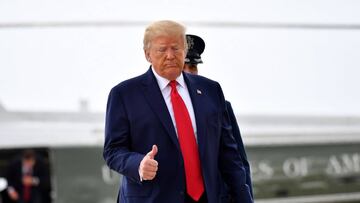Second stimulus check: August recess in Senate, likely date by which we'll know if there will be a second payment
Republicans and Democrats are working on a bill that, among other measures, will give millions of Americans a second stimulus check amid the Covid-19 outbreak.

Since the House of Representatives approved the Democrats' HEROES Act last month there have been no other official legislative proposals that would give Americans a second round of stimulus checks amid the coronavirus pandemic. Democrats are pushing the Senate to approve their bill but the Republicans are in no rush to send out a second payment and even declared the HEROES Act ‘dead on arrival.’ Of course, with the Republicans holding a majority in the Senate, the HEROES Act is going nowhere unless the Democrats can make the changes necessary to convince the GOP to back it.
After the Memorial Day break the Senate reconvened on 1 June, with a backdrop of the Covid-19 pandemic and and the riots that escalated over the death of George Floyd at the hands of the Minneapolis police. The main focus of the Republicans has been reopening the economy and instead of sending a second stimulus payment, they want to give people bonuses for finding jobs or returning back to work.
Since reopening the economy in all the states of the country there has been a slight decrease in unemployment rates, which has slowed down the approval of a bill that would send a second payment to many Americans who are still struggling due to the outbreak.
Senate Majority Leader Mitch McConnell said that discussion of a second stimulus check will be the last thing on the agenda and Senator John Thune predicted that any relief package would only pass in July.
"If you look right now at the schedule for the balance of the June work period is DOD [Department of Defense], great outdoors, a couple circuit judges. I don't know how you can wedge that in there," Thune said.
On top of the packed agenda the Republican-controlled Senate will take a recess for a two-week 4 July break, returning on 20 July. That means if there a new bill is to be approved it won't be until late July because if no decision is reached the senators have to be back in Washington for three weeks before traditional August recess, which this year starts on 8 August, according to the draft calendar.
If we get close to the August recess with no advance on proposals for a second stimulus check, it can be taken as read that the matter will be shelved until after the summer recess (the Senate reconvenes on 8 September). It's anyone's guess what the pandemic - and the economy - will look like at that point, and whether there will be political will to push for further aid packages to help struggling Americans with the economic fall out of Covid-19.
The economy will play a big factor in approval of a second stimulus check
Republicans have made it very clear that they are not so keen about sending a second round of $1,200 checks per individual because they feel it will hurt the economy and raise government borrowing, which is at historically high levels. Instead they want to give bonuses for those who return to work or get a new job.
Related stories
Republicans have stated that “Congress should take a thoughtful approach and not rush to pass expensive legislation paid for with more debt before gaining a better understanding of the economic condition of the country,” Senate Finance Committee Chairman Chuck said last Friday.
The CARES Act signed and approved by President Donald Trump back in March was a $2.2 trillion stimulus relief package that helped over 150 million Americans. If there is a new bill approved by the end of July, then some Republicans have discussed keeping the total cost under $1 trillion which, if passed in that manner, would mean that the money sent would likely be less than $1,200 per person.
